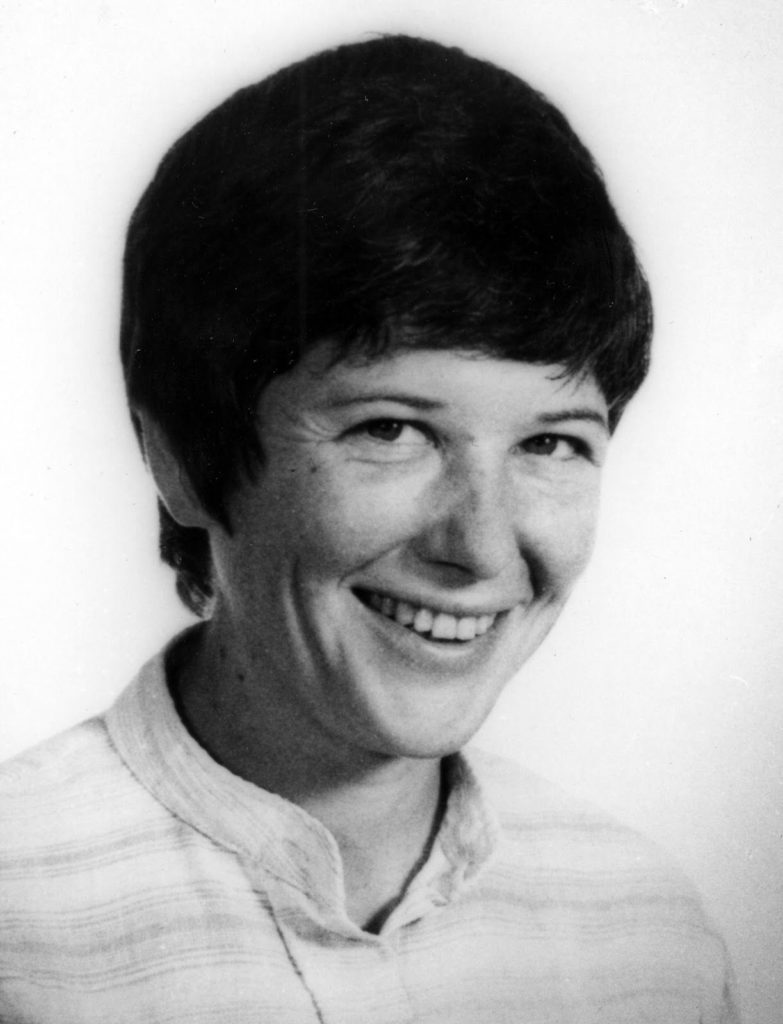
Sister Ita Ford “I never said, ‘Help, or save me, or I’m drowning’,” Ita told her mother on a tape she sent home describing her close call with death on August 23rd 1980 in a flash flood which took her friend, Sister Carol Piette, M.M. “Something was happening and I said, ‘Receive me, Lord, I’m coming.”
The Lord made her wait for three more months before he accepted the offering of her life. Much of Ita’s life had been spent waiting. When she was a child, she, her brother Bill, and her sister Irene often waited in hospital rooms to see their father who had tuberculosis. She missed his funeral in1973 because she had to wait for a visa to leave Chile in the midst of a military coup.
Her life in Maryknoll, too, was full of disappointments and years of waiting. Born in Brooklyn, New York, on April 23, 1940, Ita joined Maryknoll in 1961 after finishing college at Marymount, but was forced to leave after three years for health reasons. For the next seven years she worked as an editor with Sadlier Publishers while she searched for what she should do with her life. Her search brought her back to Maryknoll in 1971.
Ita arrived in Chile in 1973 during the days of unrest just before the military coup, and stayed to minister to the people in years of great hardship and persecution. Chile had a profound impact on her. It was here that her commitment to the poor grew, and that she learned what this demands.
What she learned from the poor in Chile challenged her to respond to Archbishop Romero’s call for help in El Salvador. She arrived there shortly after Archbishop Romero’s death. The new beginning was not easy. She missed the Sisters and her friends in Chile; the new work was not immediately clear, and it took time to gain acceptance and trust from the people who were being terrorized by the political situation.
The obstacles grew increasingly numerous as Ita and Carol responded to the needs of “the hurting,homeless, and hungry.” They were conscious of the political implications of feeding the hungry in this repressive society which was in a state of “undeclared civil war” and of the potential for ever greater conflict and growing U.S. involvement. In the midst of this already painful situation, Carol’s tragic death was a heavy blow to Ita. She questioned why she had been spared and grieved deeply for her friend and sister apostle.
Her fate, like that of the poor, was to follow in the footsteps of Christ to the bitter end. “This is how we know what love is: Christ gave his life for us. We too, then, ought to give our lives for our brothers.” (1 John 3:16). And so she did with three others on December 2, 1980.
Ita’s buoyant personality, her wit, and her sense of humor and fun were a striking contrast to the suffering and pain she experienced throughout her life. Her twinkling eyes and elfin grin would surface irrepressibly even in the midst of poverty and sorrow. Ita loved to sing and dance and was a welcome addition to any party. She had a gift with words which she probably inherited from her father whose letters were full of his own original words and phrases.
Though Ita and Maura spent less than a year in El Salvador and accomplished little in human terms– in their powerlessness, suffering, and death they will be remembered forever. As a telegram from the leaders of the Democratic Revolutionary Front of San Salvador so eloquently stated, “Their outstanding lives and their unjustified deaths will be part of the history of our people’s struggle for total liberation.” In our Maryknoll history, too, these martyrs for justice will have a special place.
Ita has touched all our lives with her many gifts and in death she leaves us the greatest gift of all –the witness of her life laid down in love. Ita found the purpose and meaning of life among God’s poor. Let us ask her to be with us as our guide and companion as we too search for that which she has found. We close with the words she wrote to her godchild and niece, Jennifer, on her 16th birthday:
“I hope you come to find that which gives life a deep meaning for you. Some thing worth living for — may be even worth dying for – some thing that energizes you, enthuses you, enables you to keep moving ahead. I can’t tell you what it might be – that’s for you to find, to choose, to love. I can just encourage you to start looking and support you in the search.”
